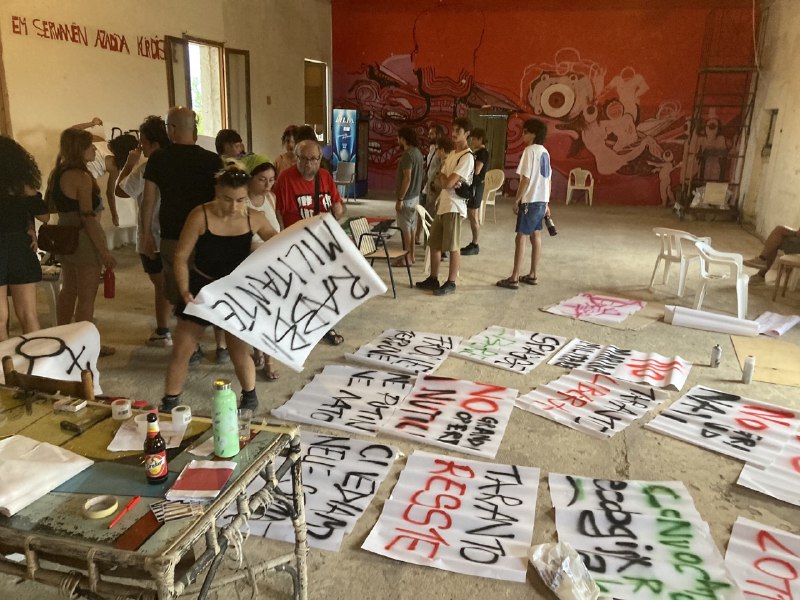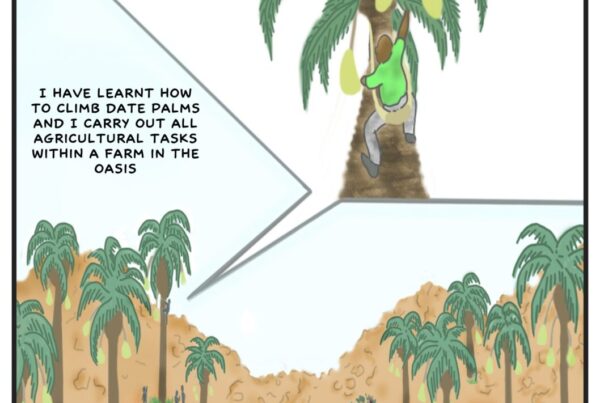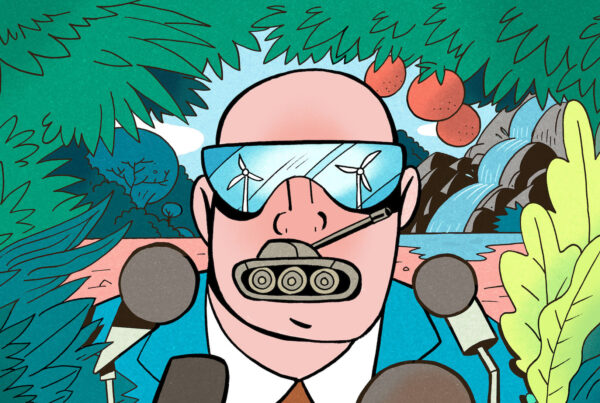By Laurie Parsons, in conversation with Gustavo García López and Flora Pereira da Silva
We discuss major topics related to Parsons’ new book, Carbon Colonialism: How rich countries export climate breakdown, from the diverse meanings of climate colonialism and the centrality of the globalization of factories in this, to the invisibility of these factories’ impacts and the myths of sustainable consumption and green growth, to how to narrate local-to-global stories and achieve impact beyond academia.
How and why did you get to writing this book at this moment, and for whom? One of the things that struck us about it is the comprehensive global perspective linked with local stories. Could you elaborate on how these previous experiences informed the book?
LP: This book is a confluence of a range of experiences. I’ve been working in Cambodia since I was 23, almost 15 years now. So to a certain extent, there is an autobiographical element, trying to make sense of the different issues I’ve been working on. But there was also a trigger to it, being at COP 26 (Conference of the Parties of the UN Framework Convention on Climate Change) back in 2021. One of the things that really struck me there was the huge variety of voices, using completely different languages and frames to understand the issues, and they don’t communicate with one another. This seemed like a metaphor of the environmental movement and a signal of the inequality of voices which shape the ways environmental and climate politics play out. By its very nature, environmental politics is dominated by large-scale figures and economic green growth thinking. The real local lived experiences of climate change have very little presence in these meetings. So bridging the divide between the global scale and these lived experiences of climate breakdown was one of the main motivations, to communicate this to a broader audience.
This is a very difficult thing to do, jumping through these scales globally interconnected without being incredibly confusing, so I tried to center it on human stories much as possible. Sopeap is one of them, named at the end, a garbage picker. Her experience is completely outside the landscape of sustainability policy. She works in a dump of waste from goods going to the West, to Europe, the US, and in particular, the UK. She’s standing at the nexus of environment and climate change and the global economy, and yet she is not covered by any sustainability policy, doesn’t work in a corporate environment, is not supported by charity or any NGO. She is invisible to the sustainability landscape. So bringing out that contradiction on a human scale highlights how much is missing from our understanding of the environment. Another person is Yay Mom , a clear example of how climate breakdown manifests in people’s lives. She was a smallholder farmer, did wage work for other people, and as a result of economic and environmental pressures, she ended up a destitute, at 87 years old, begging for a living in Phnom Penh. This shows that you can’t separate the economic and environmental, they are intertwined, and this is above all what I want to show in this book.
Did you purposefully think of the audience as being non-academic? For us at Undisciplined Environments, this question of writing for a broader audience is ever present. Could you share some insights on how you achieved this?
LP: Yes, definitely. One of the great things about writing is that you can write for different audiences, making the same point in different ways. There is no universal language or intellectual monolith that means exactly the same thing to everybody. So bringing these ideas to a broader audience is very important, including for ethical-political reasons. One of the things Farhana Sultana, a major climate coloniality scholar, says is that we need to think and write with people at the margins, bringing that genuine voice and lived experiences out to a wider public, and communicate from person-to-person is one of the key things I wanted to do, using the privilege I have as a bridge for that huge divide.
One underlying perspective that underpins this approach is to write what you know and think back to your own memories and physical experiences, on the inhabitants of those memories. It was a very cathartic experience writing the book, because it felt like spending time with those memories, in those places, thinking how that place at that time felt. Also, if you look at your memories back through time, you get an additional dimension that is really useful, which is understanding how your experience has changed over time. I talk about this in the book, the way in which my initial perspectives as a young man were very naive, and under-informed, even if with good motivations. Understanding how these initial approaches in their ignorance are shaped by broader academic debates and other experiences is very important, to get distance from yourself, to get critical reflexivity.
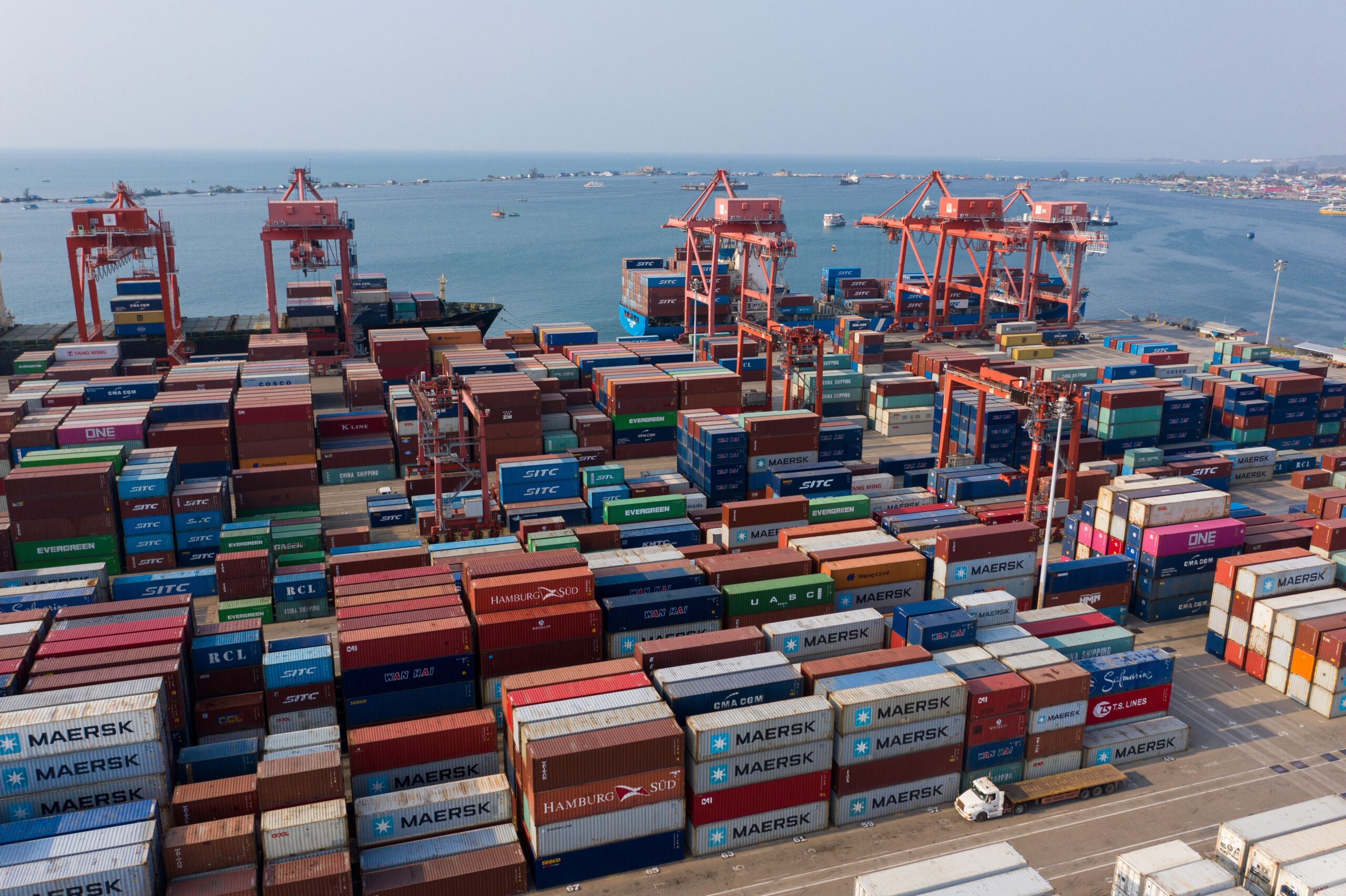
Port in Phnom Penh, Cambodia. Source: Laurie Parson
One of the most interesting aspects of this book is that it is not just about carbon or colonialism, but carbon colonialism is a metaphor for the centrality of the global factory as part of a globalization that is becoming “self-sustaining” and “self-degrading”. Could you reflect more on the centrality of the global factory and how this questions the dominant ways of approaching climate action?
LP: As I mentioned, the book is an effort to cohere and make sense of different perspectives. On the one hand, cohering my own perspectives in Cambodia and beyond, trying to link them together into a unifying truth, but also on a more contemporary global level, the phrase “carbon colonialism” and the way it is increasingly being used in different ways. Most commonly it is used in relation to “carbon offsets”, purchasing lands for carbon negativity for carbon industries, and second, carbon outsourcing, where you get someone to produce goods outside your national borders so that your national emissions go off your stats. But it’s also being used in relation to carbon capture and storage, sucking carbon out of the atmosphere, and also to refer to how national deforestation targets can be used to crack down on small-scale traditional livelihoods like swidden farming. It’s also being used in other ways; one book I thought was fantastic was Max Liborion’s book Pollution is Colonialism, she talks about the ways of our underlying ethos of the ways we think about waste and acceptable levels of it are fundamentally colonialist, it’s about imposing hard guidelines which are presented as objective, on other territories. So these ideas have really flowered in recent years and I was fascinated by the different ways of thinking about carbon colonialism.
This book, rather than fixating on one of them, really tries to identify the common, coherent meaning, of all these approaches. And the conclusion is that these are fundamentally not different processes, but the same. This means that our approach to sustainability almost inevitably reflects our approach to the economy over the last 500 years, and we can draw a straight line from the way our economy first became international with that separation of land, labor, and capital, which I discuss in relation to the cotton industry, to the way in which the global economy has intensified, with an incredibly strong, sophisticated system of logistics, which has allowed the global factory to operate across multiple countries, even within the same part of the supply chain. It’s more intensive, bigger, more complex, harder to regulate, but is still essentially the same system. And ultimately is a system which has always been zero-sum, separating materials, resources, creating value through that, and the majority of the value goes to one part of the system, and the majority of waste stays in a different part. But we don’t think of this system this way, as zero-sum, we think of growth essentially out of nothing, as progress, a teleology, a destiny that we’re naturally moving forward. I don’t dispute the idea that we could not generate value and wealth in the future by being more innovative and sustainable in different ways, but our current system is absolutely not doing that, it’s digging up more matter from the ground, separating waste from value, and the value goes to the center, the wealthiest nations, and the waste remains at the periphery.
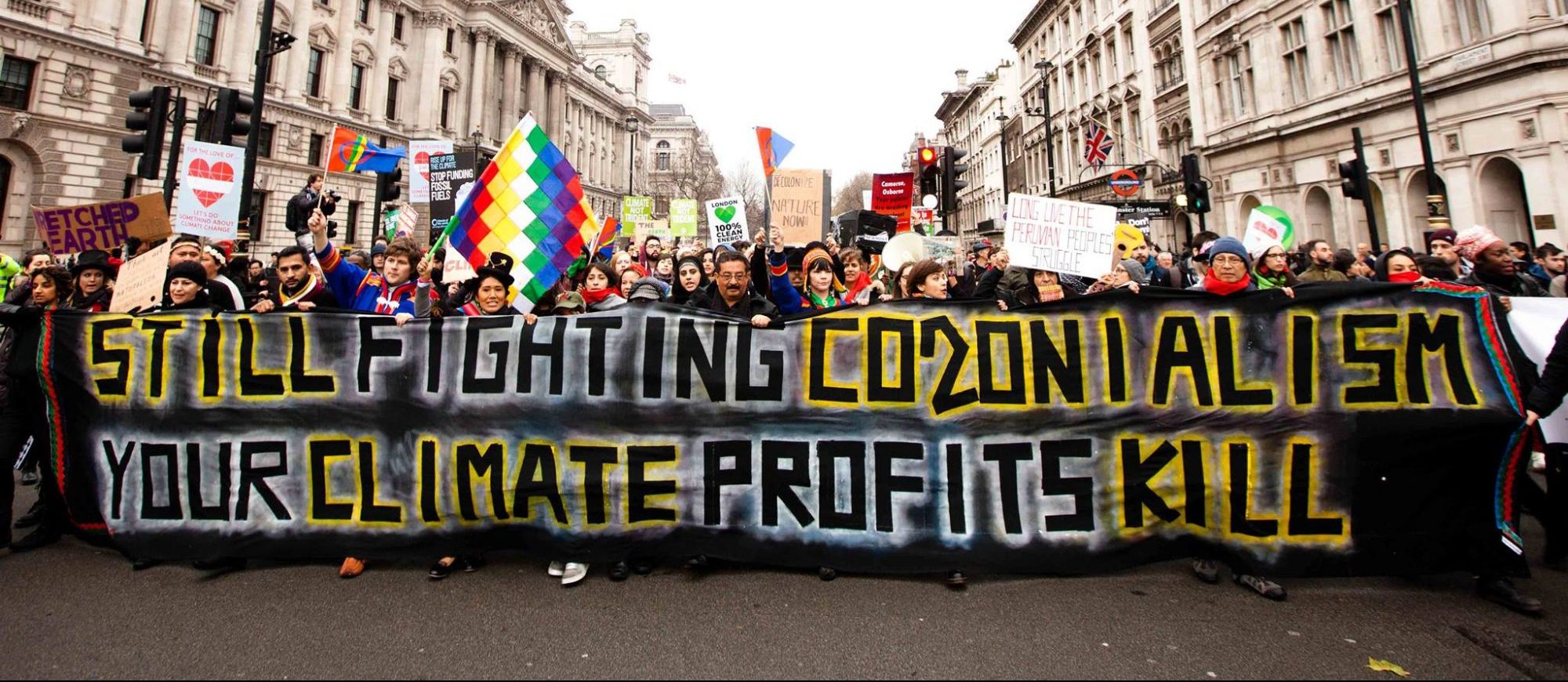
March through London, UK on 6th Nov 2021, as part of a Global Day of Action for Climate Justice during the Glasgow COP26 Global Climate Summit. Source: https://popularresistance.org/the-internal-struggle-within-extinction-rebellion-us/
Colonialism is about historical power relations but is also about gender and race. Are those two lenses you purposely avoid addressing in the book? How did these topics come across during your 15 years working in the climate and labor intersection? And why did you choose not to further explore them in this book?
LP: Because colonialism is such a huge topic and can be used to explain almost everything, there was an intentional effort to focus on colonialism as an economic system, economic colonialism, as the separation of land, labor, and capital. Perhaps an underemphasized element in debates on this topic, though definitely the race and gender dimensions are also important and can be seen in this case.
On race, Kathryn Yusssof and Farhana Sultana address this exceptionally well. This can also be conceived through Cedric Robinson’s idea of Racial capitalism – the idea that capital isn’t really being capital until it creates distinctions of value – and racial divisions have been a key axis of this kind of differentiation in recent centuries. Cambodia is a more ethnically homogenous country, but there are the Vietnamese, who have been discriminated against. In the garment industry, you have a very well-documented history of racialized thinking, the slave trade for cotton was the most extreme case, but those same colonial attitudes are still seen today, in different standards for people of different races. The fact that the environmental abuses we see in Cambodia couldn’t happen in Europe, but are acceptable in other places, is absolutely a key part of this thinking. Also, the idea of terra nullius, of empty land, the idea that Europe is all occupied and civilized and that we can bring economies and development processes wholesale into those other areas because they are areas of nothing, and thus they’ll be grateful, it’s a fundamentally racialized concept, a direct import of the colonial system.
The gender dimension is also hugely important, in the feminization of labor in the global economy: the garment industry, one of the key examples of the global factory, is one of the few global industries that are hugely feminized, 85-90% female in Cambodia. Also, in the garment industry, the issue of remittances is very important, workers send around 50% of their salaries, and women tend to send more. So this is one of the reasons there are so many female characters in the book, is because they tend to exemplify very well how intersectional inequalities are felt most keenly by those at the bottom of the social hierarchies. These issues are certainly important, and perhaps to be further in the next book.
One key argument in your book is about the invisibility of globalized supply chains and the misleading information about the environmental/carbon and human rights impacts of the products we are buying. This deeply questions the idea of consumers’ power to promote sustainability in industries. Are information and visibility part of the solution, given the structural forces that drive those impacts? And could you elaborate on how this plays out in your research?
LP: The question of in/visibility is very important, and this comes from personal experience of seeing what actually happens in these supply chains, particularly in Cambodia. The book discusses the extent to which global export industries, and particularly the garment industry, have to pay so little mind to the regulations that are theoretically in place. We’ve looked into factories with thousands of tonnes of firewood burnt to make the steam to iron clothing going primarily to the UK. And all of those brands have claims of zero deforestation in their supply chain. Also, there is a huge dump in the Cambodian capital city Phnom Penh, all garments, and there is a whole company entirely set up to ship garments to that dump. You have factories burning garment waste. And none of that is a secret, it’s just there in the open, yet when you look at what those brands say about those goods, of course, none of that information is there. There is a willful, deliberative ignorance about the environmental impacts of these supply chains.
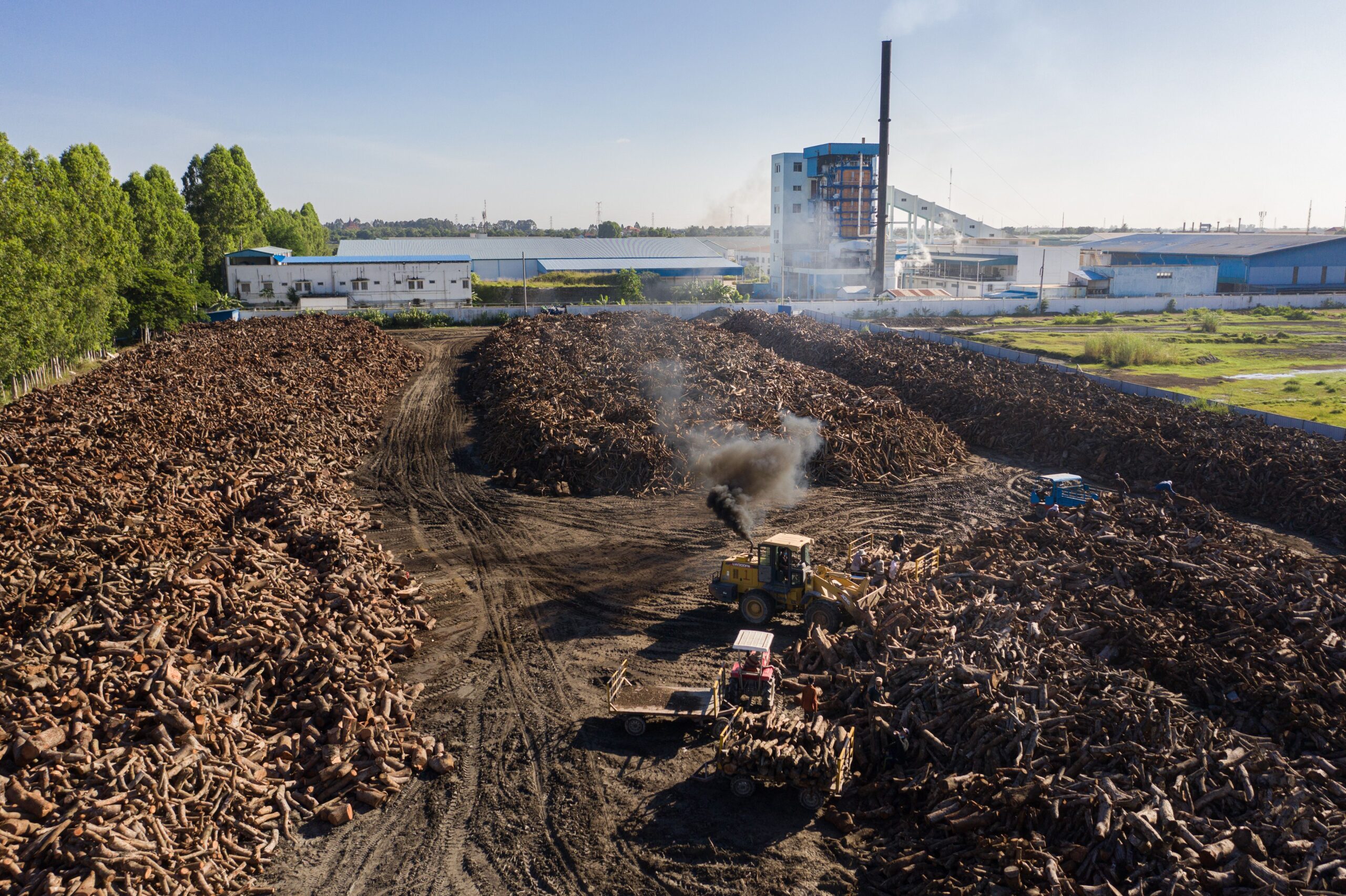
Enormous piles of firewood are burnt to generate electricity for a garment export factory in Phom Penh, Cambodia.
And the key point is I don’t believe this is not just a small-scale failure of regulation, of Cambodia not being tidy enough of these things, but rather really a function of the transformations to the global economy in the last 50 years. There’s always been a global economy but now it is global in a fundamentally increased sense. You no longer have a single factory producing goods, now, cotton is produced in one or several places, woven in another place, it is shipped thousands of miles, and what happens in Cambodia is just the last phase, sewing things together from a clothing template. And so having oversight over all of that is incredibly difficult, very few people have the jurisdiction or capacity to do that in real-time. Whilst we are told to expect that we can still see what happens to our supply chain as a modern technological advance of having just one global factory, in fact, we’ve completely lost our capacity to oversee that factory.
We’re used to the idea of the death of distance because we are used to having these talks in real time, here we are talking between London and Portugal. But distance still matters in terms of the ability to undertake rigorous scrutiny of your claims about goods and production processes. So what people rely on are checklists and standards, but there is no real recourse if those standards are not met, and there is no rigorous monitoring. The second key process which makes monitoring difficult is the disaggregation of the supply chain. You no longer have a company owning all of the components of the supply chain, which used to be the profitable way, all linked together. This disintegration of production reduces accountability massively. Now we have one lead firm and all the producers are essentially partners, they’re not part of the lead firm supply chain. So, if a lead firm like Gap or Levi Strauss is found to have produced goods in a factory with child labor, or to be burning their own waste, sending goods to landfills, or using forest wood, what the lead firm will do is simply cut ties with the factory, and say they’ve been let down by the supplier, it’s not their responsibility, and move on to their next supplier and exactly the same thing begins arrangement. Lead firms have no real tangible and legal responsibility for what happens on the ground in their production processes, and there is no supply chain law to make it different.
Ultimately, a lot of the environmental abuses in our economy are not about making malicious decisions, but about incentives. If the law is about being rigorous with the supply chain, that’s cheap and makes economic sense, companies have to please their shareholders, so you go with that incentive. The law is central to resolving this issue. You can’t insist on responsibility if you don’t have frameworks to enforce it. The key problem facilitating all of this is that, in this globalized economy, our legal system has not caught up at all, it has remained within our national borders.
In many areas of the rich world, we have developed strong environmental laws with clear tangible guidelines of what producers can do, and if they don’t do that, there are consequences, but they only apply within domestic borders. Yet in countries like the UK and most of Europe, where most of our goods are produced outside of the country, you are essentially creating an unlegislated landscape for most of our economy. We need to get away from seeing our economies as being national and see them as interconnected spiderwebs that extend beyond our national area, and say that we have the same responsibility for what happens in those supply chains overseas as what happens within. We’re just beginning to see the first green shoots of this: the French Supply Chain Law from 2017, though it’s quite weak, the UK did one in 2021 but it’s also quite weak and only applies to plastics and some other things, and the German Supply Chain Law which actually has some teeth, because of the strength of the Green Party.
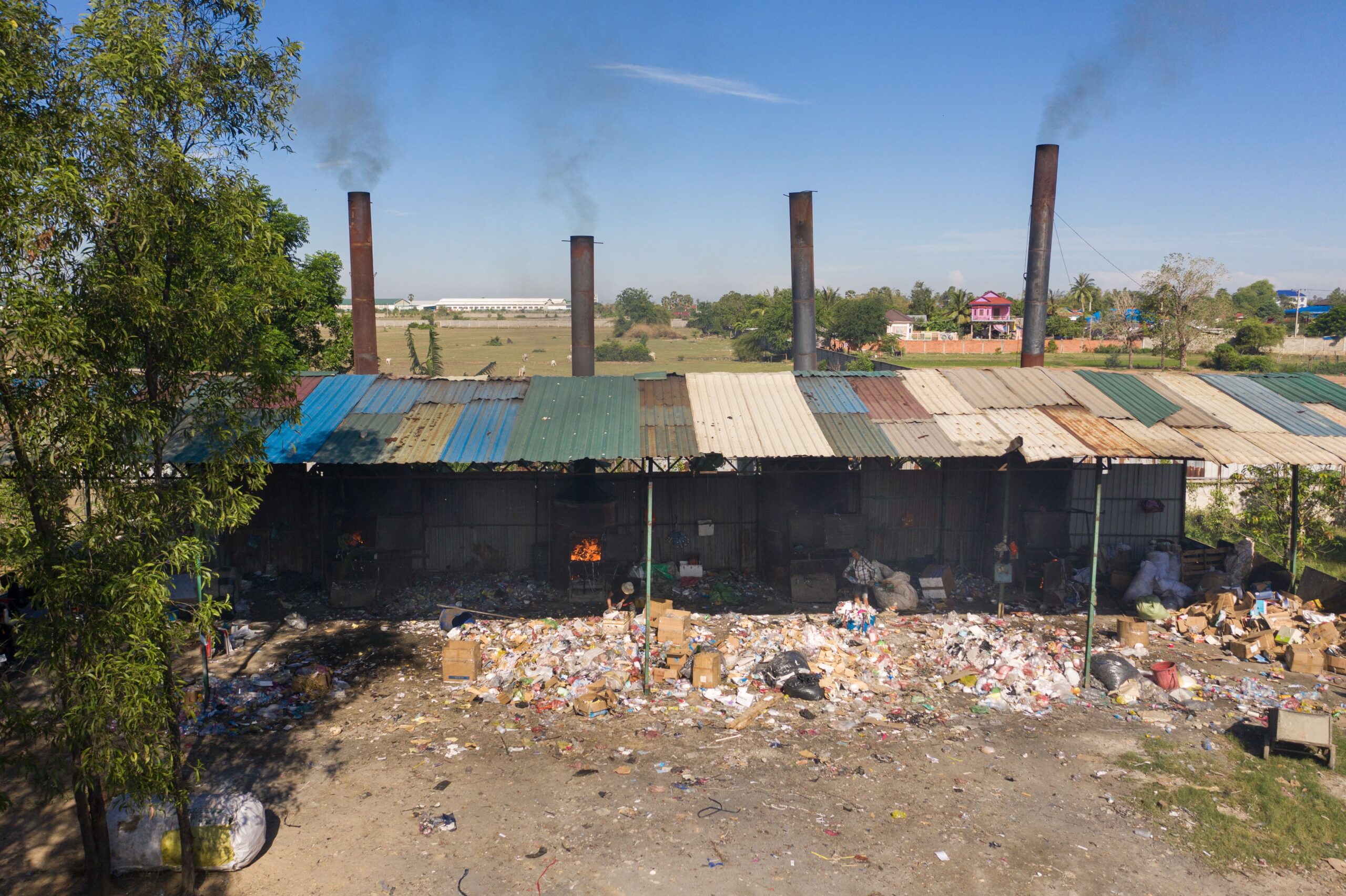
Improvised landfill burning garment waste in Phnom Penh, Cambodia. Source: Laurie Parsons.
The question of what we can do about this looms large throughout the book. You say the solution to this invisibility is getting political about climate science and making changes to the system. Can you share an example, and could you elaborate on the idea of getting political? The question is not about individual response, but what would be a good example of climate citizenship?
LP: We have a huge privilege in many areas of the wealthy world, that we have good systems to facilitate public opinion and oversight, and despite often being circumvented and weakened in recent years, it’s still there, you still have a local government, access to your council, oversight of the political process. Everyday people can be involved in this, and they can build a movement to insist on environmental standards and lobby the central government for change. This is something that is not so hard to achieve, partly because there is a general untapped political will, an awareness that we cannot treat the rest of the world as a waste ground for our production.
But so much of the best intentions of people who really care about the environment and the social impacts of climate breakdown are diverted to sustainable consumption, people are told constantly that the best thing to do is to buy consciously, buy less, change behavior. And my skepticism towards that is the problem of invisibility, the lack of direct oversight. The rigor about environmental claims, partly because there are so many, is generally limited, and is hard to make an impact through consumption choices. Getting involved in politics at the local level is the way to make a sea change that will lead to tangible, durable legislation, and that will really have an impact. Plastic is an example. Until 2017, huge amounts of plastics were exported in particular to China and the Global South. It’s still a massive problem but not nearly as much as in 2010 when it was increasing well over 1000% in the EU and UK. China’s law banning plastic imports was a starting point for the EU banning plastic exports. And this shows the power of laws, you look at the data and see how much the problem was reduced, in a way sustainable consumption could never do. So organizing to lobby and use the political system at our disposal, which we are privileged to have, is the absolute key, we need to get into the mindset of still having that power.
In the book, you have the example of the Blood Bricks report and your critical reflections on what can be done. What would you say is the role of research in addressing the invisibility problem and supporting action?
LP: Research has a privileged and very important role because of this issue of invisibility and unequal knowledge and voice. This sits on a wider trend away from the idea of academia as existing in the ivory tower, with reified intellectual exercises. Now researchers are more aware of their capacity to change society and their responsibility to do so. A phrase I like for this is scholar-activism, the idea that we need to think through a clear line of sight from our ideas to the goals we can achieve: what can I get involved in, what can I reshape and do?
I’m very much involved in activism, in particular NGO impact-focused work in Cambodia, to both uncover issues which are difficult and underexplored, but also to effect change, and put in systems and frameworks to address those issues. It is one of the hardest things to do as a researcher because you don’t necessarily see yourself as having that power. The question of “what can I do to change this” needs to be part of the research process. This has surprisingly good results, researchers have a privilege, people want to talk to them, and you have a cache that allows you to get involved in a way that not everyone can. In the UK, my research has been cited as a case study in the Parliament Committee on Trade and Environment, influencing legislation at the national level. At the local council level, for instance, we’ve got a few councils to pass memoranda banning imported bricks violating environmental standards in their areas. There are so many easy wins. Small wins at the local levels, pushing this information at the top level, being on the ground and informing NGOs, and bringing those voices to the policy spheres: it is all very important as part of a holistic approach to solving these problems.
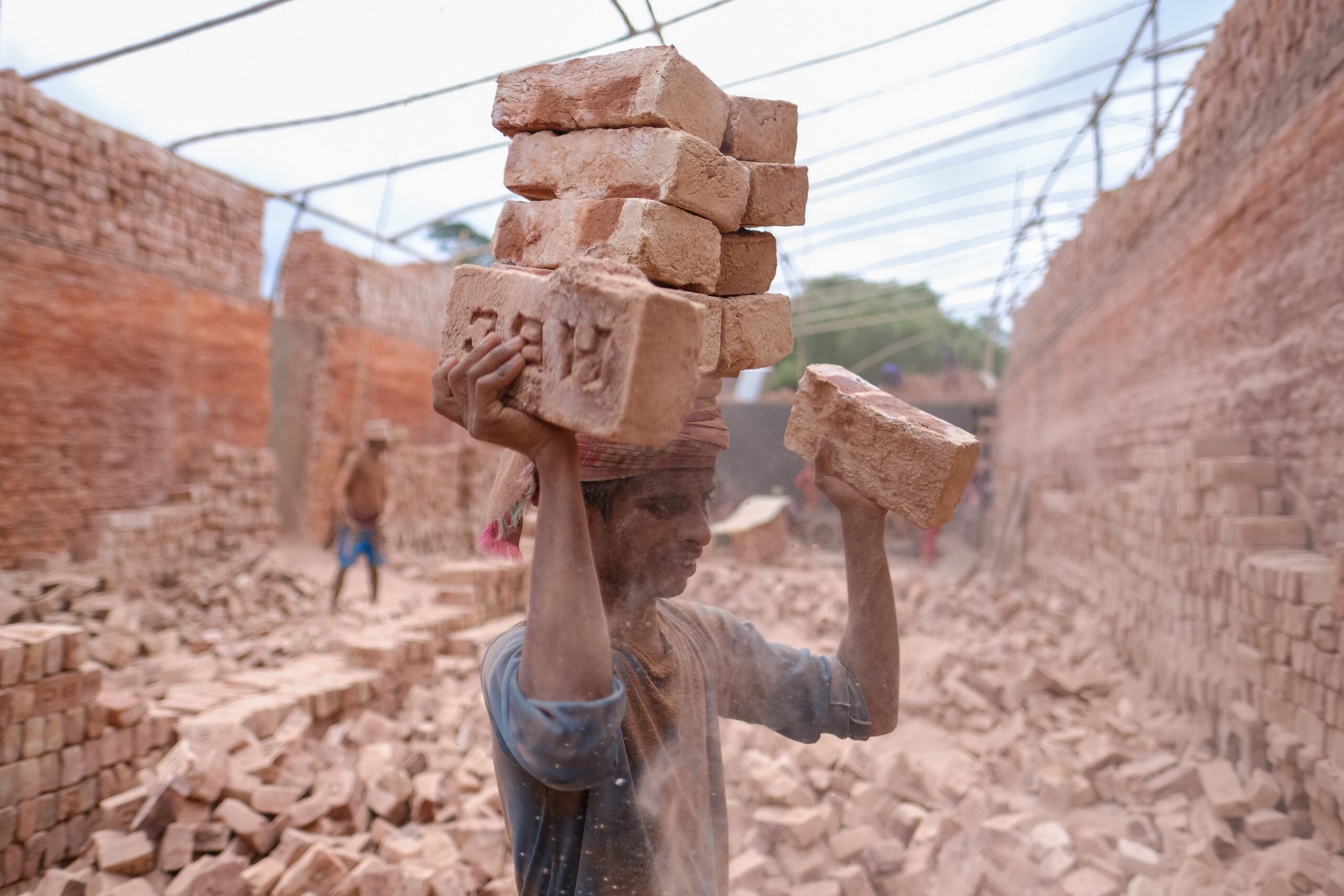
Worker at a brick factory in Bangladesh. Source: Laurie Parsons.
You mention in your book that a key battleground on climate change lies in the domain of sustainable narratives: those who control discourses will also control what the public perceives as reasonable climate action. In this dispute, what would you say is the role of big climate events like COP or the UN Biodiversity Summit? And, can the Loss and Damage Fund be seen as a positive output of these negotiation spaces?
LR: The Loss and Damage agenda on COP27 was a bright spot in an otherwise very bleak conference, where very little happened, and I believe it has the potential to be important, but when it comes to climate policy, the devil is always in the details. This agenda has been to some extent coopted by the same logic of economic development which has been a problem for sustainability in general – more debt, extending financializing of adaptation, making it a question of insurance. The ways in which these policies are articulated and play out on the ground are important. We need to have critical scrutiny, being a kind of radical cynic of these actions, which I mention in the book. Yes, we need climate action, but not in this way, otherwise we end up deepening the problems.
There are many examples of this. One I have worked on most is climate migration, it’s not so much in this book because I’ve written another book about it. This is something people love to talk about, and it’s a classic example of an issue that many people can get behind, but the narrative that comes out of it ultimately has become a catalyst for deepening these inequalities. It means walls and security, a strengthening of the anti-immigration narrative, which leading politicians love to talk about, ‘they’re coming in, they’re coming for you’. It really takes attention away from what we need to be doing, thinking about other frames: the fact that these are our workers out there, and their conditions are to a large extent our responsibility. So reshaping that frame really changes the range of policy options and the range of outcomes we can expect. Having real scrutiny over how we describe these processes is really important.
Eduard Said states that the power to narrate or prevent other narratives is essential for colonization and for imperialism, in an attempt to legitimize the idea of domination of one culture over others. Is this happening with the idea of a decarbonized society? Where do you think sustainable narratives and discourses are most in dispute and being controlled? And who would you say is creating counter-narratives, to oppose this reasoning process?
LP: Frantz Fanon talked about decolonizing the mind, which was about decolonizing narratives and frames we bring with us to understand the world. It comes down to this idea of moving forwards or dumping sideways, the difference between the underlying trajectory of sustainability as evolving and moving forwards, or a critical zero-sum approach, where we consider that we may be moving these problems rather than eliminating them. So digging down to the fundamental narratives is quite important. I mention William Nordhaus several times in the book – Nobel Prize in Economics winner, one of the main proponents of green growth – but many people don’t know that in his Nobel Prize acceptance speech, he said 4 degrees is the optimal balance of economic and environmental concerns. For the vast majority of the population, even in privileged countries like ours, this is unacceptable, and yet that is the trajectory we are on. So providing other narratives is vital. These alternatives can unleash new and more effective ideas.

The delusions of economic growth. Art by Polyp the cartoonist. Source: https://polyp.org.uk/cartoons/environment/polyp_cartoon_Economic_Growth_Ecology.jpg
Considering these criticisms of globalization and green growth, how do you feel about ongoing discussions on degrowth and post-growth as potential solutions?
LP: It’s amazing how dominant these ideas of green growth really are when the data clearly shows that these have not worked, economic growth has always equaled growth of resource extraction. In the nineties, there was decoupling in some areas, and this added rocket fuel to the idea of green growth and made it hegemonic to our discussions on sustainability. But there has been no decoupling since then, and the ratio of growth to resource extraction is worse today, so we’ve made no progress, and yet we continue in this trajectory because it seems as if that is all we have. We need a very different perspective on material resources, a different view of what is important, a different measure of progress. If we apply our technologies and our will to using less, reusing, recycling, that can achieve huge improvements, but it needs a complete shift in focus and a real change in trajectory. It’s not just one thing that can be done. We have a whole global economy focused on extraction and the separation of value from waste, and the hiding of waste from accountability. It appears almost impossible to challenge but narratives that tap into people’s moral impetus towards justice and against exploitation are crucial, because ultimately, popular will has a huge amount of power, especially when it is directed and articulated in effective ways.
—
Laurie Parsons is Senior Lecturer in Human Geography at Royal Holloway, University of London. He is Principal Investigator of the projects The Disaster Trade: The Hidden Footprint of UK Imports and Investment Overseas and Hot Trends: How the Global Garment Industry Shapes Climate Vulnerability in Cambodia, and was previously Co-Investigator of the project Blood Bricks: Untold Stories of Modern Slavery and Climate Change from Cambodia. His research explores the experience of climate change in the global economy, exposing the hidden environmental impacts of global production and unequal landscape of exposure to climate change impacts.
Flora Pereira da Silva is a Ph.D. Student in Postcolonialisms and Global Citizenship at the Faculty of Economics of the University of Coimbra, and a member of the Ecology and Society Workshop (ECOSOC) at the Center for Social Studies. She researches southern ontologies and epistemologies related to climate, environment, and land, through the lens of postcolonial critique and political ecology. She also works as the International Education and Outreach Director at the Pulitzer Center, responsible for leading the rainforest program and teams in countries of the Amazon, Congo Basin, and Southeast Asia.
Gustavo García-López is an engaged researcher, educator, and apprentice organizer from the islands of Puerto Rico, accompanying environmental/climate justice and commons-making movements. He currently works as FCT-CEECIND Researcher at the Center for Social Studies of the University of Coimbra, where he is part of the Ecology and Society Workshop (ECOSOC). He is also part of the editorial collective at Undisciplined Environments.


